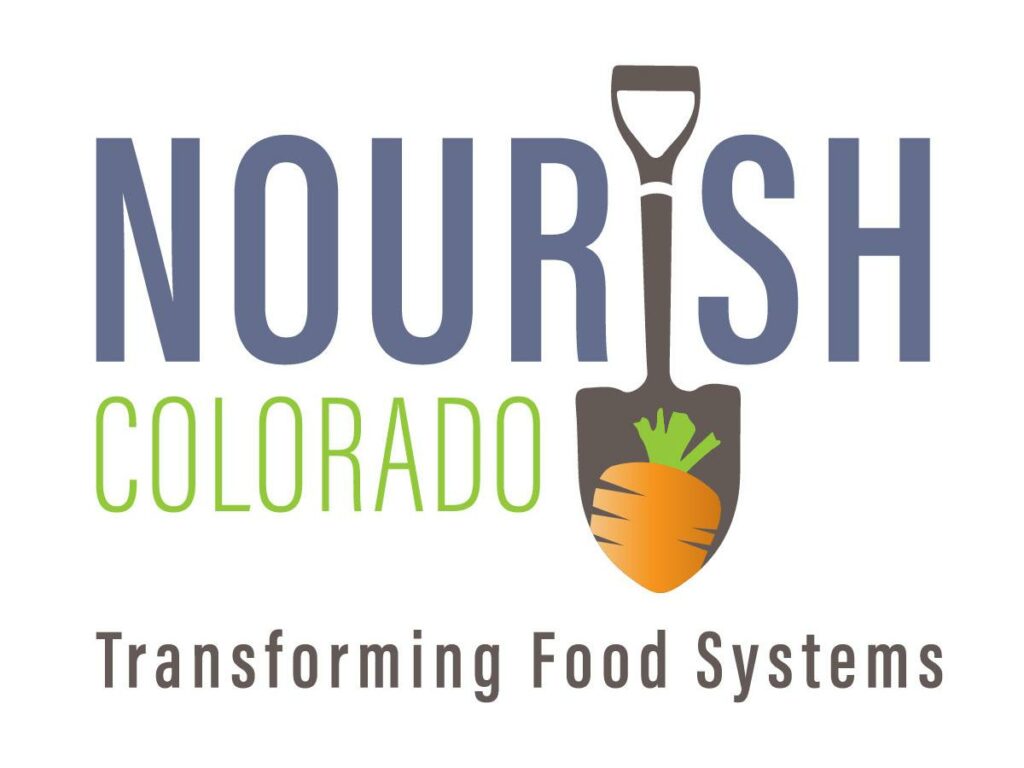By Emma Kaznowski, Linny Harden, and Red Clifford
Hi! We’re Emma, Linny, and Red, and over the past nine months, we have been working with Nourish Colorado, in collaboration with the Farm Equity Coalition, in laying the foundation for the organization and its partners to help expand farm equity in the state.
The Farm Equity Coalition, staffed and organized by the Blueprint to End Hunger, is a collective of BIPOC, female, and LGBTQIA+ farmers and ranchers working to collect and analyze data on farmer/rancher/farmworker diversity in Colorado; to help gather federal and local resources and funding to support BIPOC, female, and LGBTQIA+ farmers and ranchers; and to help promote state policies that ensure land and water rights for BIPOC, female, and LGBTQIA+ farmers and ranchers across the state.
Who are we, and why were we tasked with this project?
We are all in our second year of the Masters of Environment (MENV) program at the University of Colorado Boulder, specializing in sustainable food systems. The program is a two-year professional master’s degree, meaning that the program’s cornerstone is a Capstone project rather than typical research. In February 2022, we were assigned as a student team to work with Nourish Colorado.
What was the goal of the project?
Our project aimed to assess the equity landscape for systemically marginalized farmers, ranchers, and farmworkers throughout the state, with the intent of assisting Nourish in their initial equity efforts. The ultimate outcome of the project was to create a report of recommendations for Nourish Colorado, the Farm Equity Coalition, and other related organizations, centered on conducting farm equity work in Colorado and based on the needs and wants of underrepresented farmers, ranchers, and farmworkers.
How did we go about meeting this goal?
Our project consisted of five phases:
1. Background
We conducted a literature review to familiarize ourselves with the Colorado food system landscape and understand what resources were available around food system equity. This document informed our first draft of interview questions. We also were introduced to current farm demographic data trends through a data expert and a deep dive into the USDA Census of Agriculture.
2. Process Interviews
We interviewed Nourish Colorado partners already working in the field of farm equity, with the intention of vetting our farmer interview process to ensure the approach reflected the social and cultural norms of the Colorado food system. These interviews allowed space for us to discuss appropriate ways to interview farmers, ranchers, and farmworkers, and to create concise interview questions.
3. Farmer, Rancher, and Farmworker Interviews
We interviewed farmers, ranchers, farm workers, and partner organizations to learn their perspectives on resource needs, resource-access barriers, and trusted organizations. Additionally, we spoke with interviewees about potential state-wide farmer and rancher equity intervention opportunities.
4. Farmer and Rancher Equity Outreach Survey
We created and disseminated a survey based on the questions asked in Phase Three interviews. Through access to multiple grower lists, the survey expanded the project’s geographic reach.
5. Analysis
Our last step was to analyze our results and compile a report of recommendations for continuing equity work with farmers, ranchers, and farmworkers.
What were the main project outcomes?
Our team wrote a 60-page report of recommendations, explaining who we are, detailing the project purpose and methods, summarizing major themes from our interviews and survey, and listing the resulting recommendations. In total, we wrote 39 recommendations, relating to the outreach process and substantive action. Three highlights from our recommendations are as follows:
- Find a common definition of “farmer” that is appropriately representative. FrontLine Farming is an organization that is actively seeking to define and use inclusionary language.
- Form an extensive network of translators and interpreters fluent linguistically and culturally in Spanish, as well as other languages that are spoken by the farm workers, and support educational programs that teach farmworkers English. The Community Language Cooperative does great work in this space already.
- Secure funding for Promotora networks to uplift the work they are already conducting in this space, particularly to help pay the Promotoras for their time, expertise, and efforts.
We recognize that the work we recommend is not new, so we did our best to reference organizations already involved in the processes within our recommendations section (as seen in the two recommendations above).
Nourish Colorado will use this report to fuel their next steps in farmer, rancher, and farmworker equity work. Additionally, any person, group, or organization who would like to apply the recommendations to their work could easily do so.
Want to get involved?
If you would like to learn more or potentially participate in Nourish CO’s and the Farm Equity Coalition’s efforts, please reach out to Becca Gredone at becca@nourishcolorado.org or Wendy Peters Moschetti at wendy@nourishcolorado.org with the subject line “Farm Equity Interest,” and they will connect with you!
